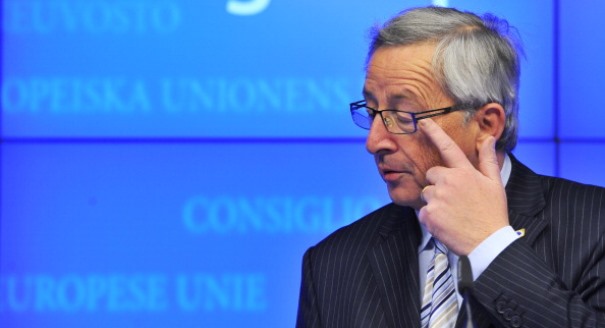If ever there was a chance for European Union leaders to show courage and take risks, it was at the Eastern Partnership (EaP) summit that took place in Riga on May 21–22.
In the Latvian capital, the 28 leaders had the chance to reach out to Eastern Europe in a way that would have reassured those living there that the EU was committed to making the region an arc of stability and democracy.
Instead, the EU lost its nerve over taking the EaP countries of Armenia, Azerbaijan, Belarus, Georgia, Moldova, and Ukraine to a new level. The union didn’t want another confrontation with Russia—as if that was going to deter Moscow from continuing to meddle in Ukraine and in Eastern Europe as a whole.
The reassurance that pro-Europeans and civil-society movements and individuals from the Eastern European countries wanted to hear was that joining the EU, however far down the road, was a perspective. Instead, EU leaders took away that perspective.
The declaration of the Riga meeting stated that “Summit participants reaffirm the sovereign right of each partner freely to choose the level of ambition and the goals to which it aspires in its relations with the European Union.” The document added: “It is for the EU and its sovereign partners to decide on how they want to proceed in their relations.”
Imagine the reaction had EU leaders used such language during the 1990s, when the former Communist countries of Eastern and Central Europe were determined to join the Euro-Atlantic organizations of the EU and NATO.
EU leaders stressed in Riga that that the Eastern Partnership aimed “at building a common area of shared democracy, prosperity, stability and increased cooperation.” But with Russia clearly in mind, they added that the EaP was not directed against anyone, demonstrating that they did not want to antagonize Moscow. “In this context, the Summit participants express their willingness to help rebuild trust and confidence on our continent,” the declaration affirmed.
And that was Riga’s flaw: when EU leaders referred to rebuilding trust, they had Russia—or rather, its president, Vladimir Putin—in mind, not Eastern Europe. Yet it was Putin’s annexation of Crimea in March 2014 and Russia’s invasion of eastern Ukraine that broke Europe’s trust and confidence—as if the writing wasn’t already on the wall after Russia’s short war against Georgia in 2008.
In short, Russia’s actions, particularly in Ukraine, have completely undermined the European security architecture, which was anchored on trust and mutual confidence. For EU leaders to believe that trust can be rebuilt as Russia continues to meddle in Ukraine, Moldova, Armenia, and Georgia is as misguided as it is disingenuous.
That is why EU leaders in Riga should have discarded their caution and Russian intimidation. Instead, they should have offered the EaP countries what has been one of the EU’s most important strategic tools for transforming societies: accession.
Throughout its history, the EU has viewed enlargement as a special, if not unique, instrument for completing the transformations of societies from authoritarian or Communist rule to democracy. Just look at what accession meant for Spain and Portugal, which joined in 1986 after emerging from long periods of dictatorship: EU membership consolidated these countries’ democracies.
This extraordinary tool also helped reunite and foster stability throughout Europe. Yet in the case of Eastern Europe, the EU has disowned this instrument and, in doing so, has rejected a policy that has distinguished Europe. And unless EU leaders have a change of heart in the near future, they have effectively given Russia a veto over the political and economic direction of Eastern Europe.
With such a message coming from Riga, it is going to be extremely difficult for reformers and supporters of civil society in Eastern Europe to push through the changes required to complete the transformation of these former Soviet republics. These states face daunting challenges, not least because they will become more vulnerable to pressure from Russia.
To be fair to the EU, the political and economic Association Agreements and the trade accords Brussels has signed with Georgia, Moldova, and Ukraine do make a difference. And the panoply of ties the EU is trying to build with Eastern Europe is, on paper, impressive. But the EU’s Eastern neighbors need something more fundamental. They need to know that they can be part of Europe. What that would do to spur reforms and democracy should not be underestimated.








